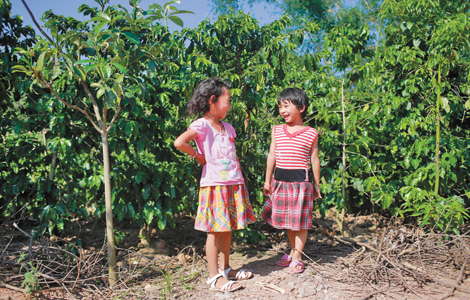Growing demand to buoy food imports
Updated: 2013-06-13 07:13
By Jin Zhu (China Daily)
|
|||||||||||
China's farm imports may rise over the next decade due to lower production growth and rising domestic demand, senior experts said.
Despite the success China has had in its agricultural sector, the country will see slower production growth in the next 10 years with increasing resource and rural labor constraints, according to the Agricultural Outlook 2013-22 report.
Jointly released by the Organization for Economic Cooperation and Development and the Food and Agriculture Organization of the United Nations, the report predicts decelerating global agricultural production growth, reflecting limited expansion of agricultural land, rising production costs, growing resource constraints and increasing environmental pressures.
The UN has forecast that China's population will reach 1.39 billion by 2022, with the urban population increasing by 138 million.
"China's consumption demand for agricultural products has already seen dramatic changes, and it will be a formidable task for the country to ensure sufficient food supply," said Zhang Hecheng, who is in charge of market and economic information for the Ministry of Agriculture.
According to the report, China will see a further modest opening of its agricultural sector as consumption growth will slightly outpace production growth over the next decade.
For instance, oilseed imports are expected to rise 40 percent over the next 10 years, accounting for 59 percent of global trade in the commodity.
China's meat imports will reach 1.7 million tons by 2022 driven by population and income growth. Bovine meat will become the fastest growing import sector, with an average annual growth rate of 7 percent, the report said.
However, agricultural officials and analysts said China will remain self-sufficient in its main food crops, such as wheat and rice, due to strong government support and investment.
The nation's grain output exceeded 589 million tons in 2012, which was also the ninth consecutive year of larger grain harvests, the ministry said.
"Governments need to create the right environment for growth and trade," said Angel Gurria, OECD secretary-general. "Agricultural reforms have played a key role in China's remarkable progress in expanding production and improving domestic food security."
Fan Shenggen, director-general of the International Food Policy Research Institute, said African countries have great potential for agricultural production growth, but policy, investment and technological support are urgently needed.
Major grain producers, such as China and India, may import some agricultural products to satisfy domestic demand as their production growth slows, he said.
"But their imports will be a good opportunity for other countries to strengthen agricultural production, if import demand remains stable and doesn't trigger fluctuations in overseas markets," he said.
Fan called for more international information sharing in the agricultural sector, which will be critical in best utilizing global resources to feed the world's population in a sustainable way.
"At present, global information sharing on agricultural prices is timely," he said. "But countries should further open their information on agricultural reserves."
jinzhu@chinadaily.com.cn
(China Daily 06/13/2013 page3)
Related Stories
Food waste hinders China's sustainable development 2013-06-08 17:39
Health food companies warned over false ads 2013-06-08 10:56
China to maintain food self-sufficiency: report 2013-06-07 10:20
Chinese vice premier stresses food, drug safety 2013-06-06 03:33
Health food warning over added drugs 2013-05-24 19:17
Today's Top News
4 caught over killings of Chinese in PNG
Rudd sworn in as Australian prime minister
China slams Japan's new defense white paper
IBM to make Chinese job cuts
Building equipment sector shifts overseas
Stocks hold steady, but brokers still cautious
China can curb credit crunch: ADB official
Mandela still critical, Zuma cancels trip
Hot Topics
Lunar probe , China growth forecasts, Emission rules get tougher, China seen through 'colored lens', International board,
Editor's Picks

|

|

|

|

|

|





